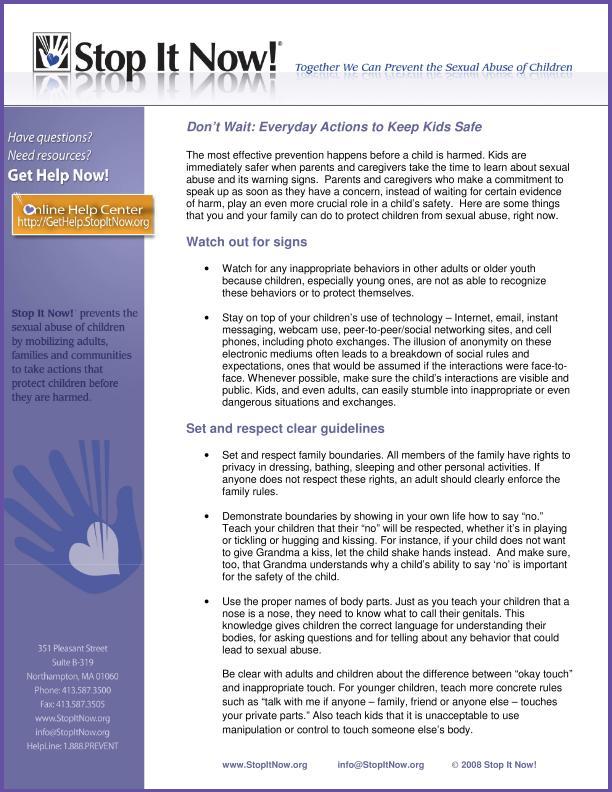.

|
|
Concerned about Sex Offenders in Your Neighborhood?
EDITOR'S NOTE: We highly recommend the many resources, tip sheets and valuable available through the "Stop It Now!" non profit web site: www.StopItNow.org
A neighbor tells you about a “pedophile down the street”, you learn of a “sexual predator” who's a member of your faith community, the local paper reports on “child molesters hanging around” at your kid's school. What can you do?
You thought your neighborhood was pretty safe. Suddenly, your sense of security is shaken. Media stereotypes about people who sexually abuse children can make it all seem overwhelming. You needn't be overwhelmed.
Start by learning the facts.
Accurate information about the situation can help you turn fear into confidence that you really can keep your family safe. Here are some other things you can do to help make you feel secure again.
What you can do
Don't panic, respond calmly
Act with thought. Many people with a history of sexually offending are motivated to succeed when they re-enter society. Contrary to conventional wisdom, counseling can be very effective. Re-arrest rates for sexual offenses are actually very low. When given steady support, counseling and supervision they often pose little threat to anyone in the neighborhood. |
Create a family safety plan Your children and your family need to know what to do if anyone — family, friend, acquaintance, neighbor, or stranger — is approaching a child sexually. Remember, abuse is most likely to happen with someone you already know. Download Create Your Family Safety Plan for details. If there was a public notice, ask the contact person or organization on the notice for more information. There may be a public meeting, local resources, or other materials that would help you and your family. Information may be available on the state's sex offender registry.
Attend the public community notification meeting
If there is community notification meeting, go to learn more about this person, their risk level, and how they will be supervised in the community. Learn about the restrictions that have been placed on this person so that if you see them doing something inappropriate you know how to report it.
Find out if the person convicted of a sexual offense is being supervised
Ask the person or organization who has notified you whether the person who sexually abused in the past is being supervised by a probation or parole officer. You should be able to get the name and telephone number of the probation or parole officer. This officer may be able to answer more complex questions about the risk this person may pose to your family.
Consider joining with another neighbor to meet the offender
Consider approaching the person with an offer of support, perhaps through the probation or parole office. Remember, you may already know this person or know their family and friends. Even if they are new in your community, they are a part of it now. If the person who sexually abused is open and honest about the past, they may really be trying to change and live a different life. Show your support for their willingness to live a different life that keeps children safe. Your support and watchfulness can help in their recovery. It is also a chance to alert them that you know about their past and are aware of their actions today. For a successful example of this, read this story of hope from a community member.
Notify the police if you see this person in a suspicious situation
Avoid a hostile confrontation. Making threats or taking revenge may put you at legal risk. It's also important to avoid any action that may just push the person who has sexually abused into hiding, where normal life is almost impossible and it's easier to go back to old abusive ways. No matter how you feel about this person, if you see him or her in a suspicious or dangerous situation, call the police or probation/parole officer. Many people who have sexually abused go on to live productive, abuse-free lives. But not all will make the needed changes in their lives. Your supportive watchfulness may help the person who has abused keep him or herself under control.
Don't wait to take action for prevention
What we do know is that there are people who have abused in our communities, some already identified, some not. Don't just wait to be notified about someone who has been convicted of a sexual offense. Talk to your family and friends now. Make the sexual safety of children a priority all the time with everyone in your community.
-
Remember: 88% of sexual abuse is never reported
Authorities can't notify you about most people who sexually abuse because they've never been identified.
-
Your safety action plan does not change
Whether or not you've been notified about someone with an offense in your community, you still need to be concerned about safety. Think about those who may abuse in the same way that you stay aware of possible speeding cars, children in the streets, or drug dealers near your child's school.
-
You can limit access
If you know what to look for and how to take action, people who sexually abuse children will not have access to them. Their abusive behavior can be stopped when we are all aware. They can get help to prevent any further abuse.
|